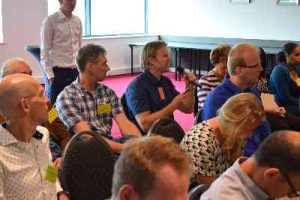Date/Time | |
About
Why the “Design of experiments (DOE) in practice” course?
Stricter quality requirements and cost considerations make it increasingly important to approach a research or experiment in a structured manner. A final product usually has to meet many quality requirements, and if that does not succeed immediately, there are many (often dozens of) process parameters with which this can be adjusted. But these process parameters can influence each other and the different quality requirements in many ways, which makes optimization complex. It pays to think carefully about optimization experiments in advance. In this course you will learn how to use statistical methods and software to extract a maximum of information from a minimum of experiments, so that all quality requirements can be met simultaneously in a short period of time. This saves time and costs and reduces the risks of failure.
For whom is this course intended?
You think and work at college (bachelor) or academic level. You work in an (applied) R&D or innovation department as a process, product or quality engineer, where you develop new products and processes, for example. Or you are an engineer who needs to improve ongoing production processes and you need DoE to discover and fix difficult problems in time. Or you are responsible for the validation of equipment, methods or processes, e.g. in a laboratory environment. Then you can use DoE to perform a validation with much less work.
Program
Program.
The following topics are covered over 4 days. In between there is plenty of time for exercises.
Day 1
- Introduction to experimental design
- Introduction to statistics, including tests
- Independence of experimental errors
- Regression analysis
- Factorial experimental schemes (model, significance, linearity)
Day 2
- Fractional factorial experimental schemes
- Step-by-step DOE design
- Confounding, Resolution, Folding
- Factorial testing schemes in blocks
- Case study: Catapult
- Power and sample size
Day 3
- Choice of DOE schemes.
- Plackett-Burman Designs
- Robustness Designs
- Trial schemes for regression analysis (response surface DOE
- Determination of Design Space
- Case: Catapult
Day 4 (return day)
- Handling of practical cases
- Handling additional theory questions and/or example cases
Methodology
During the first 3 days you will learn the principles of experimental design. You then practice the theory using practical cases, for example by optimizing the settings of a catapult. In all exercises, you will learn to use statistical software simultaneously for working out and interpreting the results. We use Minitab as standard, but you can also bring your own software package. After the first 3 days you will receive a self-study assignment with the aim of actively applying what you have learned in your own practice. After about 8 weeks, the return day (day 4) takes place. Here the self-study assignments are discussed and the first experiences with the new skills are exchanged. You will be taught by an experienced instructor from the chemical technology and analytical professional practice, who as a consultant helps clients daily with setting up experiments.
Result
Outcome.
Upon completion of this course, you will be able to apply statistical techniques for experiment design. You will be able to analyze the results of your own experiments using statistical software for various types of experimental design. This will help you get the desired results faster and save time and money for your client.
The diploma
Upon successful completion of the course, you will receive a certificate of attendance.
Other info
Time commitment
The course consists of a total of 4 days, with the first 3 days consecutive and a return day approximately 8 weeks later.
Financial investment
The investment for the course is as follows:
Course fee € 2,060 (excluding 21% VAT).
Subscribe
Clicking on the link below will redirect you to a new window where you can fill out the registration form.
Open registration form




